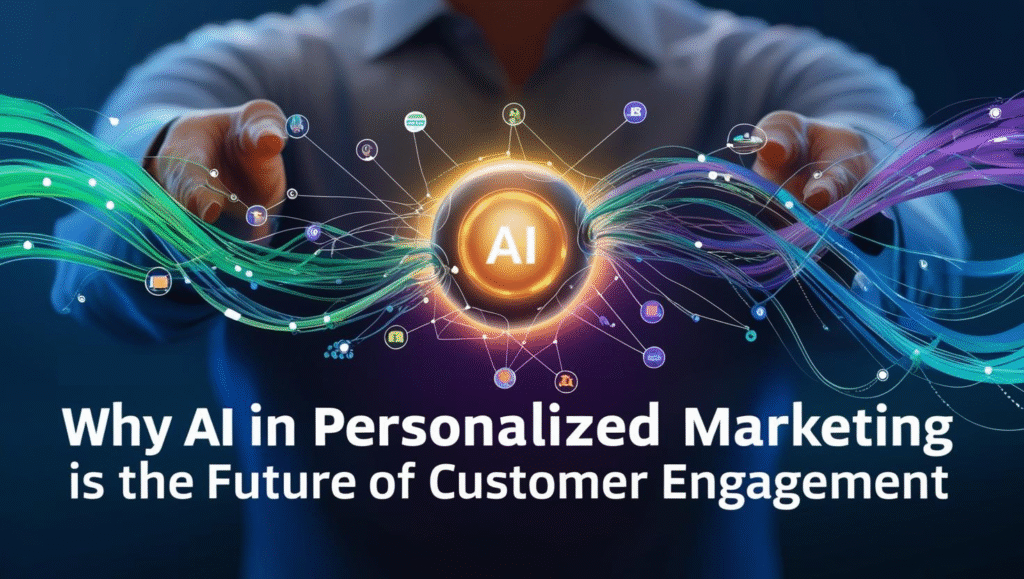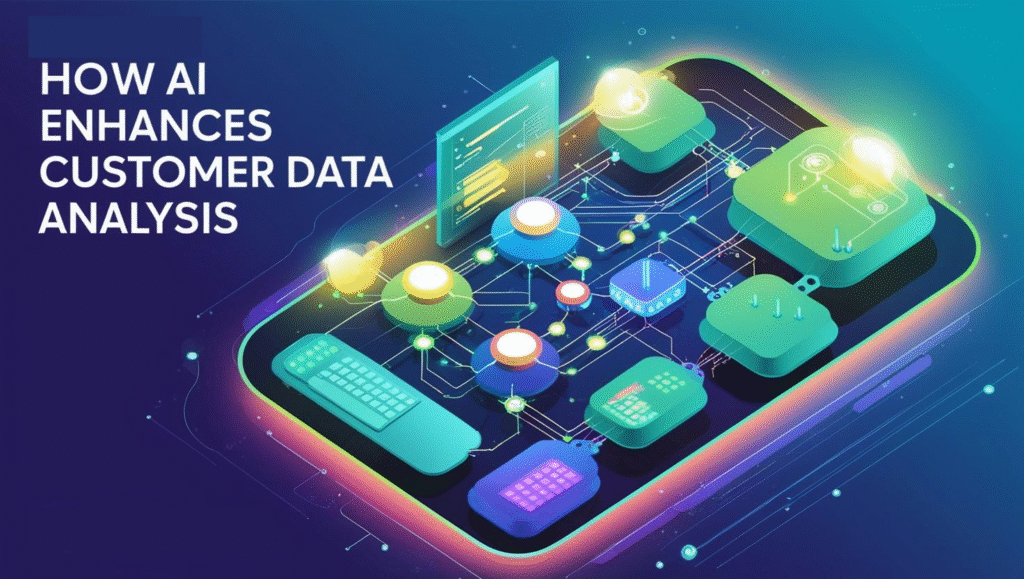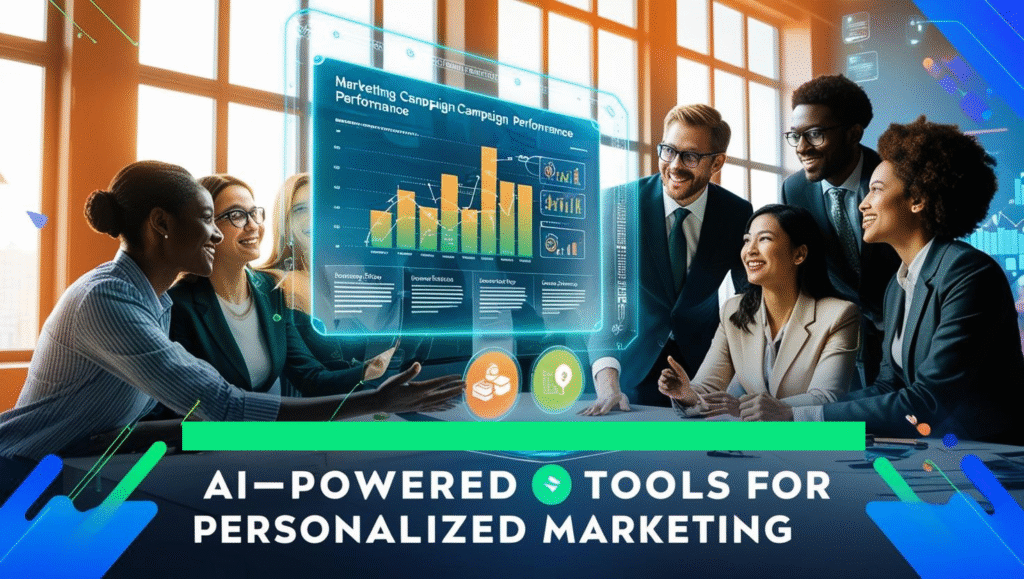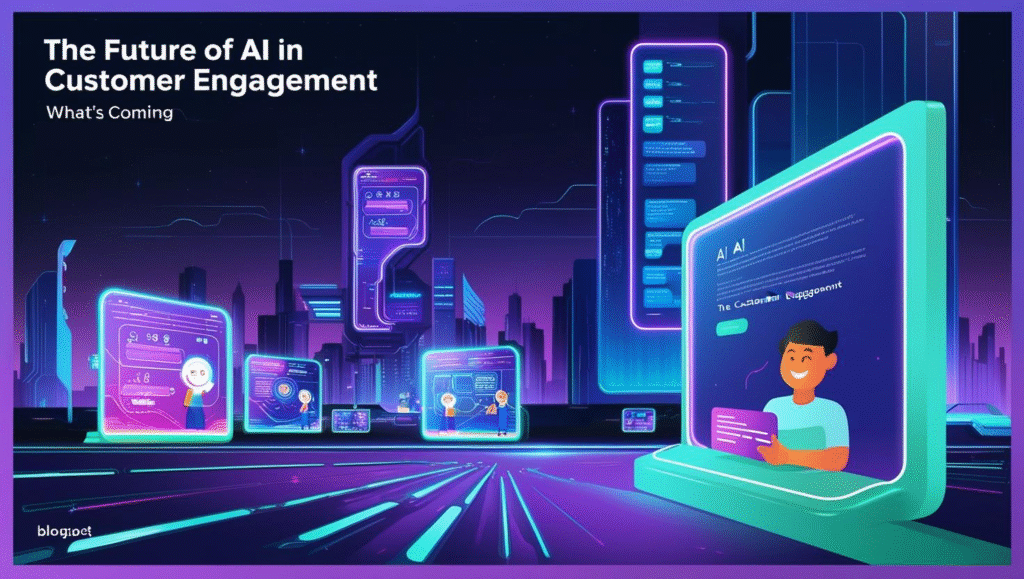Why AI in Personalized Marketing Is the Future of Customer Engagement

In a digital landscape bursting with options, capturing consumer attention has never been more challenging. Enter AI in personalized marketing that’s transforming how businesses engage with customers. By harnessing the power of smart technology, brands can now analyze vast amounts of data to understand individual preferences and behaviors like never before.
This innovative approach enables marketers to craft tailored experiences, ensuring that every interaction resonates deeply with their audience. From personalized email campaigns to targeted social media ads, AI is redefining the marketing playbook, making customer engagement not just a strategy but an art form.
As we delve into the dynamic intersection of AI and personalized marketing, we’ll explore how harnessing these intelligent tools can elevate your brand’s outreach and foster deeper connections with your audience. Ready to unlock the potential of AI in your marketing efforts? Let’s dive in!
The Evolution of Personalized Marketing
Personalized marketing has come a long way since its inception. In the early days, marketers relied on basic demographic information like age, gender, and location to tailor their messages.
This approach was revolutionary at the time, providing a more targeted way to reach consumers compared to the one-size-fits-all methods that preceded it. However, the scope of personalization was limited by the data available and the manual processes involved in analyzing it.
As technology advanced, so did the techniques for personalized marketing. The advent of the internet and digital data collection opened new avenues for understanding consumer behavior. Marketers could now track online activities such as browsing history, purchase patterns, and social media interactions.
This wealth of data allowed for more sophisticated segmentation and targeting, making marketing efforts more relevant and effective. However, the sheer volume of data soon became overwhelming, and traditional methods struggled to keep up.
Enter artificial intelligence (AI). With its ability to process vast amounts of data quickly and accurately, AI is revolutionizing personalized marketing. It can analyze complex datasets to identify patterns and trends that would be impossible for humans to discern.
This enables marketers to create highly customized experiences that resonate deeply with individual consumers. AI-driven personalization goes beyond basic segmentation; it can predict future behaviors and preferences, allowing brands to anticipate needs and deliver timely, relevant content. As a result, personalized marketing has evolved from a basic strategy to a sophisticated art form, thanks to the transformative power of AI.
How AI Enhances Customer Data Analysis

One of the most significant contributions of AI to personalized marketing is its ability to analyze customer data with unprecedented speed and accuracy.
Traditional data analysis methods are often time-consuming and prone to human error. In contrast, AI algorithms can sift through massive datasets in real-time, identifying patterns and insights that would otherwise go unnoticed. This capability is particularly valuable in today’s data-rich environment, where businesses collect information from a multitude of sources, including websites, social media, and CRM systems.
AI enhances customer data analysis by employing advanced techniques such as natural language processing (NLP) and machine learning. NLP allows AI to understand and interpret human language, enabling it to analyze text data from emails, reviews, and social media posts.
This helps marketers gain a deeper understanding of customer sentiment and preferences. Machine learning, on the other hand, enables AI to learn from data over time. As it processes more information, it becomes better at identifying trends and making predictions. This continuous learning process ensures that AI-driven insights are always up-to-date and relevant.
The ability of AI to integrate and analyze data from multiple sources provides a holistic view of the customer. Marketers can see how different touchpoints and interactions influence consumer behavior, allowing for more informed decision-making. For example, AI can reveal that a particular segment of customers responds better to email campaigns than social media ads, or that certain products are more popular among specific demographics.
With these insights, marketers can fine-tune their strategies to maximize engagement and conversion rates. In essence, AI transforms customer data into actionable intelligence, driving more effective and personalized marketing efforts.
The Role of Machine Learning in Personalization
Machine learning, a subset of AI, plays a pivotal role in the personalization of marketing efforts. Unlike traditional algorithms that follow predefined rules, machine learning models learn from data. They can adapt and improve their performance over time, making them ideal for dynamic and complex environments like personalized marketing.
By learning from past interactions, machine learning algorithms can predict future behaviors and preferences with remarkable accuracy.
One of the primary applications of machine learning in personalization is recommendation systems. These systems analyze users’ past behaviors, such as browsing history and purchase patterns, to suggest products or content that they are likely to be interested in.
Companies like Amazon and Netflix have successfully implemented machine learning-powered recommendation engines that significantly enhance user experience and drive sales. These systems continuously refine their recommendations based on new data, ensuring that they remain relevant and effective.
Another area where machine learning excels is in customer segmentation. Traditional segmentation methods often rely on predefined criteria, such as demographics or purchase history. While useful, these criteria can be limiting and may not capture the full complexity of consumer behavior.
Machine learning algorithms, however, can analyze a multitude of variables simultaneously, uncovering hidden patterns and relationships. This allows for the creation of highly specific segments that are more likely to respond positively to personalized marketing efforts.
For example, a machine learning model might identify a segment of customers who are more likely to purchase a product during a particular time of year, enabling marketers to target them with seasonal promotions.
Machine learning also enhances real-time personalization. In today’s fast-paced digital world, consumers expect immediate and relevant interactions. Machine learning algorithms can process data in real-time, allowing for instant personalization.
For instance, a customer browsing an e-commerce site might receive personalized product recommendations based on their current session behavior, increasing the likelihood of conversion. This level of responsiveness not only improves customer satisfaction but also boosts the effectiveness of marketing campaigns.
AI-Powered Tools for Personalized Marketing

The rise of AI has led to the development of a wide array of tools designed to enhance personalized marketing efforts. These tools leverage AI technologies to automate and optimize various aspects of marketing, from content creation to customer engagement.
One of the most prominent examples is chatbots. Powered by AI, chatbots can interact with customers in real-time, providing personalized responses and recommendations. They can handle a wide range of tasks, from answering frequently asked questions to guiding users through the purchasing process. By delivering instant and tailored interactions, chatbots enhance customer experience and drive engagement.
Another valuable AI-powered tool is predictive analytics. This technology uses machine learning algorithms to analyze historical data and predict future outcomes. In the context of personalized marketing, predictive analytics can forecast customer behaviors and preferences, enabling marketers to tailor their strategies accordingly.
For example, a predictive model might identify customers who are likely to churn, allowing businesses to implement targeted retention campaigns. Similarly, it can predict which products a customer is likely to purchase next, informing personalized recommendations and promotions.
AI is also transforming email marketing through tools that optimize content and timing. AI-driven email marketing platforms can analyze recipient data to determine the most relevant content for each individual. They can also identify the optimal time to send emails, increasing the likelihood of engagement.
Additionally, these platforms can automate A/B testing, continuously refining email campaigns to maximize effectiveness. By delivering personalized and timely emails, businesses can enhance customer engagement and drive higher conversion rates.
Social media marketing is another area where AI-powered tools are making a significant impact. AI algorithms can analyze social media data to identify trends and sentiment, providing valuable insights into consumer preferences and behaviors. This information can be used to create highly targeted social media campaigns that resonate with specific audiences.
Furthermore, AI-driven tools can automate social media management, scheduling posts and responding to interactions in real-time. This not only saves time but also ensures that social media efforts are always aligned with the latest trends and customer preferences.
Case Studies: Successful AI-Driven Campaigns
The transformative power of AI in personalized marketing is best illustrated through real-world success stories. One notable example is the global streaming giant, Netflix. The company leverages AI and machine learning to deliver highly personalized content recommendations to its users.
By analyzing viewing history, search queries, and even the time spent watching specific genres, Netflix’s recommendation engine suggests shows and movies that align with individual preferences. This level of personalization has been crucial in retaining subscribers and driving continued engagement on the platform.
Another compelling case study is Starbucks, which has harnessed AI to enhance its customer loyalty program. Through its mobile app, Starbucks collects data on customer purchases, preferences, and behaviors. This data is fed into AI algorithms that generate personalized offers and recommendations for each user.
For instance, if a customer frequently orders a particular type of coffee, the app might suggest similar beverages or offer a discount on their favorite drink. This personalized approach not only boosts sales but also strengthens customer loyalty by making each interaction more relevant and rewarding.
E-commerce giant Amazon is yet another example of successful AI-driven marketing. Amazon uses AI to power its recommendation engine, which suggests products based on users’ browsing and purchasing history.
The company also employs AI for dynamic pricing, adjusting product prices in real-time based on demand, competition, and other factors. This strategy ensures that customers receive the best possible offers, enhancing their shopping experience and driving higher conversion rates. Additionally, Amazon’s AI-driven marketing efforts extend to personalized email campaigns, which are tailored to individual customer preferences and behaviors.
These case studies highlight the diverse applications of AI in personalized marketing and the tangible benefits it can deliver. From streaming services to retail giants, businesses across various industries are leveraging AI to create more personalized and engaging customer experiences.
By analyzing vast amounts of data and generating actionable insights, AI enables marketers to deliver the right message to the right person at the right time. This level of precision not only enhances customer satisfaction but also drives business growth by maximizing the effectiveness of marketing efforts.
The Future of AI in Customer Engagement

As AI technology continues to evolve, several emerging trends are set to shape the future of personalized marketing and customer engagement. One such trend is the increasing use of voice-activated assistants. Devices like Amazon’s Alexa, Google Assistant, and Apple’s Siri are becoming more sophisticated, allowing for more natural and intuitive interactions with consumers.
Marketers can leverage these platforms to deliver personalized content and offers through voice-activated channels, creating new opportunities for engagement.
Another promising trend is the integration of AI with augmented reality (AR) and virtual reality (VR). These immersive technologies offer unique ways to engage customers, and AI can enhance their effectiveness by providing personalized experiences.
For example, an AR shopping app could use AI to recommend products based on a user’s preferences and past behaviors. Similarly, a VR experience could be tailored to an individual’s interests, creating a more engaging and memorable interaction.
AI-driven chatbots and virtual assistants are also expected to become more advanced, offering even greater levels of personalization. These tools can analyze real-time data to provide contextually relevant responses and recommendations. For instance, a chatbot on a retail website could suggest products based on a customer’s current browsing activity and previous purchases.
As natural language processing and machine learning technologies continue to improve, chatbots and virtual assistants will become more adept at understanding and responding to complex queries, enhancing the overall customer experience.
The use of AI in predictive analytics is also set to grow, enabling even more precise and proactive marketing strategies. By analyzing historical data and identifying patterns, AI can predict future behaviors and trends with greater accuracy. This allows marketers to anticipate customer needs and deliver timely, relevant content and offers.
For example, predictive analytics could identify customers who are likely to be interested in a new product launch, enabling targeted marketing campaigns that drive engagement and sales.
Challenges of Implementing AI in Marketing
While the potential of AI in personalized marketing is immense, implementing these technologies is not without its challenges. One of the primary obstacles is the complexity of AI systems. Developing and deploying AI algorithms requires specialized knowledge and expertise, which can be a barrier for many businesses.
Additionally, AI systems often require significant computational resources and infrastructure, which can be costly. Businesses must carefully consider the investment required and ensure that they have the necessary capabilities to support AI initiatives.
Data quality is another critical challenge. AI algorithms rely on large volumes of high-quality data to function effectively. Inaccurate, incomplete, or biased data can negatively impact the performance of AI systems, leading to suboptimal outcomes.
Ensuring data quality requires robust data management practices, including data cleaning, validation, and governance. Businesses must also consider the ethical implications of data collection and ensure that they comply with relevant regulations.
Another challenge is the integration of AI with existing systems and processes. Many businesses have legacy systems that may not be compatible with modern AI technologies. Integrating AI requires careful planning and coordination to ensure seamless operation.
Additionally, businesses must consider how AI will impact their workflows and employee roles. Implementing AI often requires changes to existing processes and may necessitate employee training and upskilling.
Finally, there is the challenge of managing consumer expectations and perceptions. While AI can enhance personalization, consumers may have concerns about privacy and the use of their data. Businesses must be transparent about their data practices and ensure that they prioritize consumer trust.
This includes providing clear explanations of how AI systems work and how data is used. Building trust with consumers is essential for the successful implementation of AI-driven personalized marketing.
Conclusion:
AI is undeniably transforming the landscape of personalized marketing, offering unprecedented opportunities for businesses to engage with their customers on a deeper level. By harnessing the power of AI, marketers can analyze vast amounts of data, predict future behaviors, and deliver highly personalized experiences that resonate with individual consumers.
From recommendation engines and chatbots to predictive analytics and AI-driven email campaigns, the applications of AI in personalized marketing are diverse and far-reaching.
However, the successful implementation of AI requires careful consideration of several factors. Businesses must ensure that they have the necessary expertise, infrastructure, and data quality to support AI initiatives.
They must also address ethical considerations, such as data privacy, algorithmic bias, and transparency. By prioritizing these factors, businesses can harness the full potential of AI to create more personalized, engaging, and effective marketing strategies.
Looking ahead, the future of personalized marketing with AI is bright. Emerging trends such as voice-activated assistants, augmented reality, and advanced chatbots are set to further enhance customer engagement. As AI technology continues to evolve, it will unlock new possibilities for personalization, enabling businesses to anticipate customer needs and deliver timely, relevant content and offers.
By staying at the forefront of these developments, businesses can build stronger connections with their customers and drive sustained growth in an increasingly competitive digital landscape.
For the latest insights and updates, be sure to explore our AI Trends & News and stay ahead in the world of artificial intelligence.

Pingback: How AI is Transforming Meal Prep with “Meal Prep AI” - AI insights world